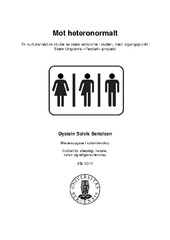| dc.description.abstract | Denne oppgaven tar for seg Skeiv Ungdoms normkritiske undervisningsopplegg "Restart". Dette undervisningsopplegget er hovedsaklig rettet mot elever i ungdomsskolen i alder 14-16. Elevene deltar i teoretiske diskusjoner knyttet til Kjønn og Seksualitet, samt øvelser som skal bryte ned forestillinger om kjønns- og seksualitetsessensialisme. Gjennom intervjuer med de Restart-ansvarlige, samt lærere og elever, undersøker oppgaven hvordan det oppstår konfrontasjoner mellom ulike oppfatninger av kjønn og seksualitet, og hvordan skeivhet og homoseksualitet skal møtes i skolen. Selv om opplegget er nøye gjennomtenkt, og gjenstand for kontinuerlig evaluering, viser elever seg å være en vanskelig gruppe å formidle budsakpet til. Man finner allikevel tegn til en gryende anerkjennelse av at normer for kjønn og seksualitet virker begrensende på deres muligheter for "å være seg selv". | en_US |
| dc.description.abstract | The last 10-15 years mark a rise in popularity and acknowledgement for what is referred to as the Queer movement. Queer activism, although a part of the history of traditional LGBT-activism, represents a parting with the traditional identity politics of the gay and lesbian movement. Far less concerned with concealing sexuality in order to maintain dignity, the queer movement is sex- positive, and lends support to BDSM-culture, Polyamory and all other expressions of sexuality that are safe and consensual. Norm criticism is also something that plays a central part of queer politics. The Norwegian organization «Skeiv Ungdom» (Queer Youth) is part of this movement. Founded in 2004, as a subdivision of the well established LLH (The National Organization for Gay, Lesbian Bisexual and Transgender people), «Queer Youth» soon after its formation became an independently run organization with its own central board, leader, employees and local chapters. An important part of Queer Youth's political agenda is to improve the quality of sex- education in the Norwegian school system. According to them, education that concerns sexuality and gender related issues, as well as the school education i general, needs to take the queer perspective into account, to a much larger extent than it does today. «Restart» is an educational program run by Queer Youth, that seeks to remedy some of the problems of Norwegian sex-education today. This program is presented mainly to students aged 14-16, but not exclusively. During 90 minutes, students are parttaking in exercises and theoretical discussions about sex and gender normativity. Deconstructing notions of fixed sexual and gender categories is paramount to the activities that take place during the sessions. Despite Restart being well thought out and continously evaluated, the project faces a few challenges. One of the most significant, it can be argued, is the differing understandings that exists between teachers, students and representatives of Queer Youth, related to how queerness should be dealt with in schools. While the Queer Youth session leaders are eager to direct attention towards the unfairness inherent to the heterosexual norm, teachers and students appear more prone to think of gay and transgender individuals as part of minority groups that must be tolerated. This presupposition stands as a polar opposite to the message that Restart is set to convey. Although respect, regardless of individual leanings and preferences, is a value worth holding on to, teachings of tolerance runs a high risk of alienating those who have to endure being tolerated. It might sometimes seem that the session leaders on the one hand, and the teachers and students on the other, are talking over each others' heads. Challenges aside, the exercises that play out in the classroom seem to be an effective way of generating discussion among students. Another interesting move that the session leaders sometimes employ, is the directing of attention towards their own sexual orientation. When performed with an awareness to avoid potential pitfalls, this action demands curiosity and respect in the classroom. However, the move is regarded with some ambivalence among the session leaders. There is a risk that the attention generated towards themselves can get exaggerated, thus defeating the purpose of Queer Youth's norm- critical message. It appears that the concept of the role-model makes up a significant part of the students' and teachers' understanding of Queer Youth's purpose, when they are visiting schools. This need not be a bad thing, but is something that should be taken into concideration, when communicating with the students that are praticipating in Restart. | en_US |
